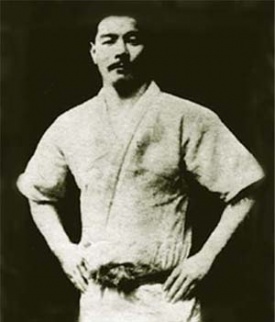Conde Koma: Difference between revisions
From Luchawiki
Jump to navigationJump to search
No edit summary |
No edit summary |
||
| (7 intermediate revisions by 2 users not shown) | |||
| Line 7: | Line 7: | ||
|family= | |family= | ||
|maestro=Kano Jigoro, Tsunejiro Tomita | |maestro=Kano Jigoro, Tsunejiro Tomita | ||
|birthdate=18 | |birthdate=[[November 18]], [[1878]]-[[Funazawa village, Hirosaki, Aomori]] [[Japan]] | ||
|debut= | |debut= | ||
|lostmaskto= | |lostmaskto= | ||
|height= | |height= | ||
|weight= | |weight= | ||
|obituarydate= | |obituarydate=[[November 28]], [[1941]]-[[Belém]] [[Brazil]] | ||
|signatureMoves= | |signatureMoves= | ||
|titles= World Jiu Jitsu Title | |titles= World Jiu Jitsu Title | ||
| Line 19: | Line 19: | ||
== Profile == | == Profile == | ||
A pre-Lutteroth era figure, Mitsuyo Maeda was a Japanese judoka toured Mexico and parts of South America in the 1910s and 1920s using the name Conde Koma. His bouts are described to be mostly exhibitions of skill, rarely matches as we'd think of them, and likely more shoots than choreographed (though this article does not attempt to be definite in any way on that.) His time in Brazil was responsible for the creation of Gracie Jiu-Jitsu. More could be found in his [https://en.wikipedia.org/wiki/Mitsuyo_Maeda wikipeida bio.] | |||
[[Category:Japanese wrestlers]] | |||
[[Category: Foreign wrestlers]] | |||
[[Category:Deceased wrestlers]] | |||
Latest revision as of 00:51, 18 August 2015
| Conde Koma | |||||||||||||||||||||||||||||
 |
|
||||||||||||||||||||||||||||
Profile
A pre-Lutteroth era figure, Mitsuyo Maeda was a Japanese judoka toured Mexico and parts of South America in the 1910s and 1920s using the name Conde Koma. His bouts are described to be mostly exhibitions of skill, rarely matches as we'd think of them, and likely more shoots than choreographed (though this article does not attempt to be definite in any way on that.) His time in Brazil was responsible for the creation of Gracie Jiu-Jitsu. More could be found in his wikipeida bio.